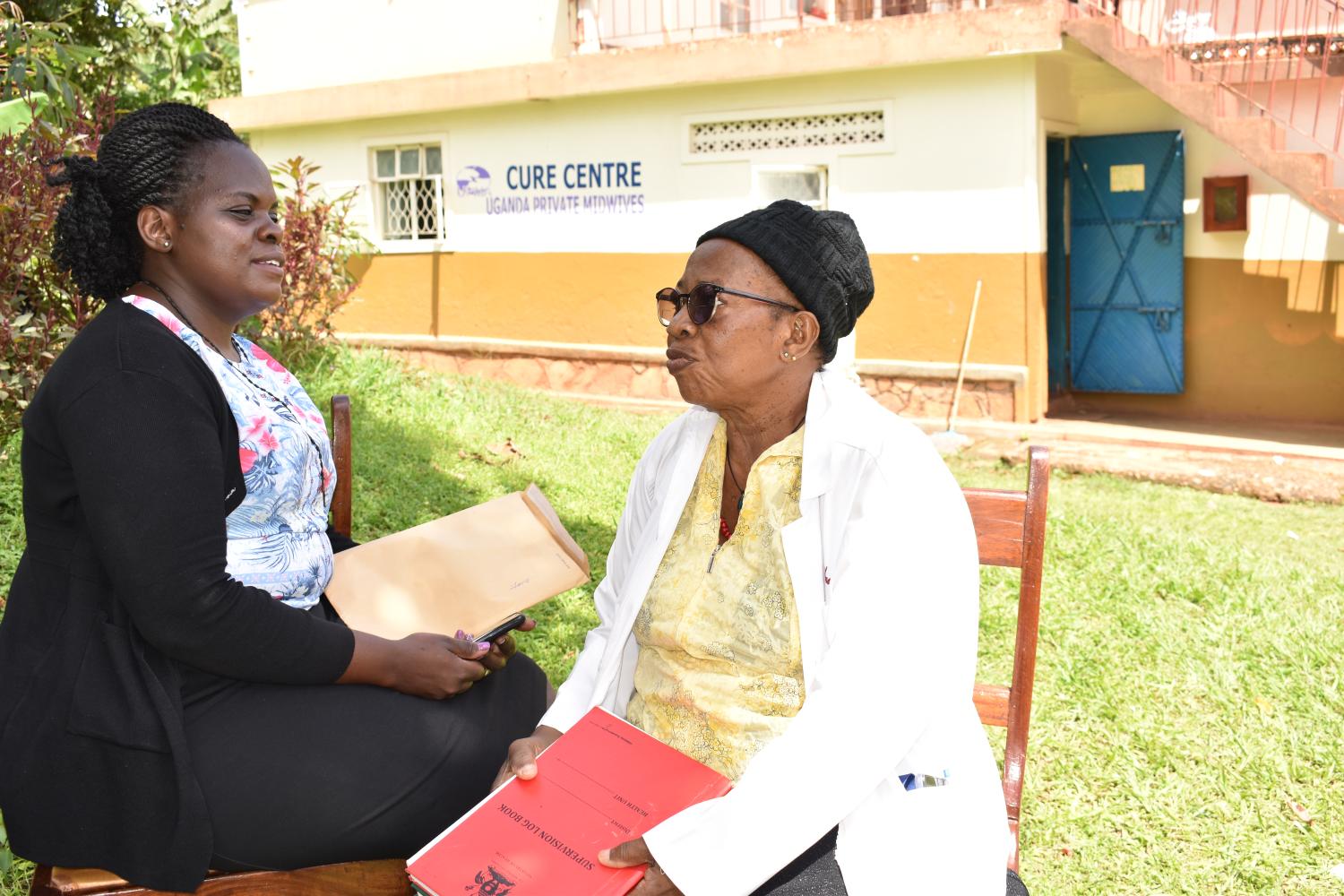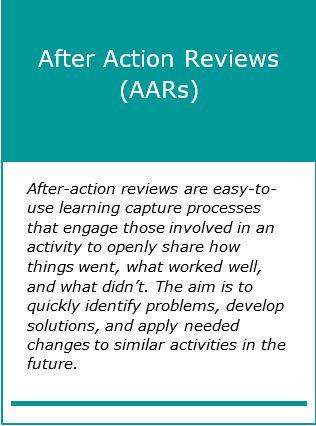Pause and Reflect to Learn and Improve: How a local NGO in Uganda built its knowledge management capacity through partnership
This blog was developed based on interviews with May Namukwaya, Fosca Tumushabe, Stella Akia, Juliet Oinomugisha, and Martha Nantongo Ssemusu with contributions from Mariela Rodriguez and Gorrety Parmu. It is the third in a series by MOMENTUM focused on knowledge management for global health programs. The first blog provides tips and tools to get all staff on board with knowledge management, while the second blog describes how knowledge management can help you find interesting stories to tell about your project activities. Please contact [email protected] if you have questions about the content in any of these blogs.

(Caption: UPMA staff Martha Nantongo speaks with a midwife, Ritah Matovu during a supportive supervision visit. Photo credit: Fosca Tumushabe/ PSI Uganda 2023.)
How do we know what we don’t know? It’s a question for the ages and a primary concern of knowledge management and learning professionals across the globe. We cannot fill knowledge gaps that we do not know exist. Fortunately, with the right partnerships, processes, and tools, these gaps often reveal themselves. The Uganda Private Midwives Association (UPMA) and PSI Uganda, a MOMENTUM implementing partner, experienced this firsthand when they conducted an organizational capacity assessment, and then began using After Action Reviews (AARs) to improve their work. Based on interviews with five staff closely involved in the UPMA/MOMENTUM partnership, this blog gives a behind-the-scenes look at how attention to knowledge management helped improve health service delivery.
Leveraging strategic partnerships to identify gaps in knowledge management
UPMA is a non-governmental organization that supports over 700 practicing private midwives working throughout Uganda to provide primary and reproductive health care services through training and advocacy. They partner with PSI Uganda via the MOMENTUM Private Healthcare Delivery project, which is part of MOMENTUM, USAID’s flagship project to improve reproductive health and accelerate reductions in maternal, newborn, and child mortality and morbidity in high-burden USAID partner countries.
One key aspect of the partnership was to strengthen UPMA’s governance and management systems, with the goal of improving the quality of its family planning services, particularly postpartum family planning. To this end, the collaboration began with an organizational capacity assessment, which revealed gaps in UPMA’s approach to knowledge management. More specifically, the assessment found that UPMA could improve on systematically capturing, documenting, and sharing learning. For example, lessons learned from programmatic activities, including clinical training or organizational processes such as the development of strategic plans, were not well documented, which meant that valuable information did not get spread widely or was not taken up by the hundreds of midwives in the network. These findings ultimately prompted PSI to support UPMA in their desire to prioritize knowledge management and learning as critical areas for action.
Using After Action Reviews to strengthen institutional capacity and improve training

As they worked to find a suitable solution to this challenge, PSI staff shared that one relatively easy approach that was working for them was conducting After Action Reviews (see box for a definition). After engaging in an AAR led by PSI Uganda, staff at UPMA agreed it could work well for them to adapt and adopt this method, and that it would help them reflect on and learn from the great work they were doing and capture it in a way that could be shared with UPMA’s members across the country. They soon began conducting AARs and using a learning tracker to document key insights and accomplishments, relevant adaptations for implementation, results, challenges, and next steps. UPMA used opportunities such as regular monthly performance review meetings, monthly branch meetings with members, and mentorship sessions to pause and reflect with staff and facilities on what was going well or what challenges were evident. The UPMA team facilitated these moments of learning and reflection with the 40 facilities that were supported by MOMENTUM.
The first time UPMA used an AAR was after a PSI-conducted training series with their health providers on Counseling for Choice, an evidence-based counseling approach focused on delivering quality, person-centered care, and supporting women to make the best choice about which contraceptive method is right for them. Since several more training sessions were planned, it was helpful to reflect on what went well and what could be improved. One UPMA staff member said that the AAR was invaluable and helped them realize that some content and opportunities for practical application needed to be added to the training:
“This AAR... led us to make some practical changes to the next training we conducted for providers working in 40 facilities where the project is being implemented. For example, we extended the training from five to seven days, and we went to the facilities to do hands-on training with patients following guidelines that PSI had provided.”
The AAR not only helped reflect on the training but also on the process of conducting spot checks with health providers at health facilities. Through this effort, they could easily see the areas where health providers had learned and applied their new training and where they still needed support. This led PSI to develop a mentorship guide for trainers and support UPMA to conduct training-of-trainers sessions to support behavior change and practical application of knowledge among trainees. The guide includes content on mentorship objectives and expectations, vital mentoring skills, stages of formal mentorship, mentorship structure, best practices, documentation, and learning.
Through their work with MOMENTUM, UPMA has been able to improve knowledge management and promote adaptive learning within their training processes, thus improving the effectiveness of their training and adding a vital on-the-job mentorship component. Quarterly on-site mentorship continues to be implemented. One of the training coordinators noted that the changes to the training were helpful and resulted in positive outcomes:
“The trainees were eager to learn, especially because we included the aspects of empathy and sympathy. Already facility monthly reports show an improvement in service delivery because of the change in the counseling method.”
Lessons that UPMA learned that may help you too!
A staff member from PSI noted that in general, as UPMA implemented the reflective AAR process, they appreciated the benefits more and more as time went on:
“In reflection meetings, they take time to brainstorm and think of new ideas and how they might have done things better. They realized it differed from just writing a report summarizing the completed activities.
A few specific lessons learned about implementing AARs include:
- It’s okay if not every single person involved in an activity participates in an AAR, as long as some key representatives are available. It’s important to schedule it soon after the activity so that memories are fresh, and the process has momentum.
- It’s important to engage and instill ownership for conducting AARs among a wide range of team members, who also receive mentorship, so that the responsibility doesn’t always fall on just one person who also has many competing demands and priorities.
- Because conducting AARs for every activity can be time-consuming and mentally exhausting and it can be logistically challenging to act quickly on all the findings, it’s important to prioritize those that are likely to result in the biggest and most meaningful impacts on staff and clients.
- Creating an effective AAR system takes time. The more you do it, the more you appreciate the benefits and can streamline and tweak the process. Pause and reflect moments can be integrated into opportunities where project staff are already reviewing implementation progress or discussing successes and challenges of specific activities.
An UPMA staff member summarizes:
“When you have a good approach, and you realize success and achievement, obviously, you recommend it. AARs help us to do things better and to learn, sit back, and think through before any other activity takes place. So, I feel this is great, that we are learning from PSI and the supporting team.”
This blog was developed by members of the knowledge management team on MOMENTUM Knowledge Accelerator. See these links to learn more about MOMENTUM, Adaptive Learning, Complexity-Aware Monitoring, Strengthening Organizational Capacity, MOMENTUM’s work with UPMA in Uganda, and UPMA’s work with midwives.



